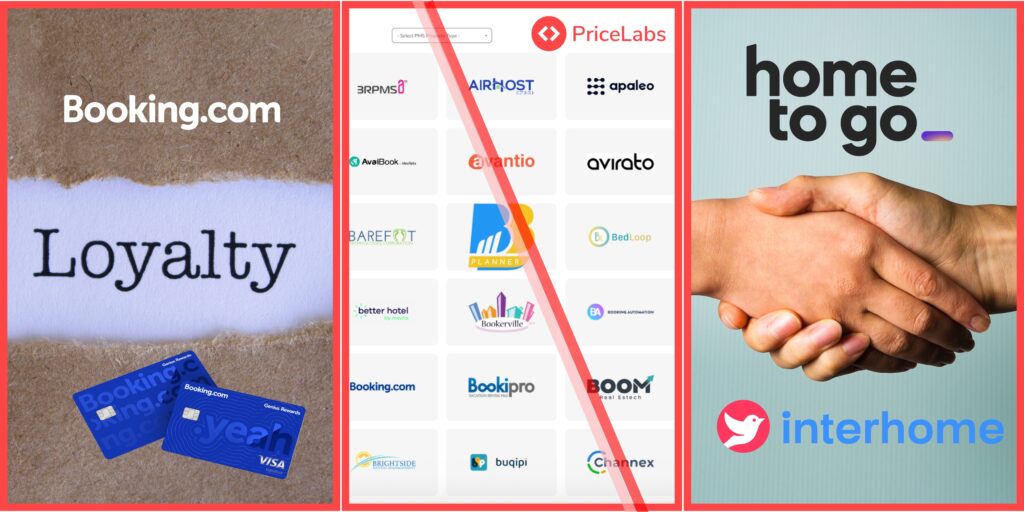PriceLabs Sets New Industry Standard with 161 PMS Integrations
- PriceLabs is now the most integrated revenue management platform in the short-term rental (STR) industry, connecting with 161 property management systems (PMSs) worldwide.
- The company hit this milestone after adding 18 new PMS integrations this year, spanning both STR-focused systems like fewo.cloud, Avirato, AvaiBook, and ResNexus, as well as hotel PMSs including StayNow365, Stayntouch.
- By adding these connections, PriceLabs opens up its revenue management tools to operators who were previously limited by their PMS, removing barriers to automation and data-driven pricing
- PriceLabs also now holds official Booking.com Connectivity Partner status, a move that gives hosts who don’t use a PMS direct access to dynamic pricing on one of the world’s largest OTAs.
Snigdha’s views:
- For years, revenue management was a sophisticated tool, and integrations were often out of reach for smaller or mid-sized operators.
- PriceLabs hitting 161 PMS connections shifts that reality. Revenue management is no longer a luxury; it’s becoming a baseline expectation across the short-term rental industry.
- For property managers, that means there’s no reason to stick with static pricing or spreadsheets anymore.
- Whether you’re running a handful of homes or a thousand, the tools are now accessible through the PriceLabs-connected PMS.
- Of course, democratization raises the bar. If everyone has access to PriceLabs, the differentiator won’t be whether you use revenue management, but how well you use it.
- Operators who invest the time to interpret data, refine strategies, and go beyond “set it and forget it” will pull ahead.
HomeToGo Closes Interhome Deal, Expands With 40,000 Rentals Across Europe
- HomeToGo has officially closed its most significant acquisition to date with the purchase of Interhome, Europe’s second-largest vacation rental management company.
- The deal brings 40,000 properties across 28 countries into HomeToGo’s portfolio and establishes the group as Europe’s leading vacation rental player.
- This acquisition also marks the completion of HomeToGo’s strategic evolution into a B2B-focused company, with its HomeToGo_PRO arm now positioned as the new center of gravity.
- HomeToGo_PRO will lead in software and tech-enabled service solutions for the vacation rental sector and become the largest direct supplier to third-party platforms.
- While Interhome will continue operating under its existing brand, its 700+ employees are joining HomeToGo, bringing the group’s headcount to nearly 1,500 globally.
- The company confirmed it will issue updated FY25 guidance soon to reflect the combined business.
About HomeToGo:
HomeToGo is a SaaS-enabled vacation rental marketplace that connects travelers with stays while providing property managers with software tools to manage listings, optimize pricing, and streamline operations.
About Interhome:
Interhome is one of Europe’s largest vacation rental providers. Unlike full-service property management companies that oversee every aspect of a home, Interhome focuses mainly on distribution, bookings, and light operational support. Much of the day-to-day guest experience, such as cleaning, maintenance, and on-the-ground services, is carried out by local partners.
Snigdha’s views:
- This acquisition is about much more than adding 40,000 properties to HomeToGo’s portfolio. It marks a shift in how the company makes money.
- For years, HomeToGo’s revenue relied heavily on ad clicks and later booking commissions, particularly after it transitioned into a marketplace.
- Today, a large and growing share comes from B2B services under the HomeToGo_PRO umbrella.
- By owning Interhome, HomeToGo can capture more of the value chain: property management fees, ancillary revenue from cleaning, insurance, and guest services, plus opportunities to cross-sell its SaaS tools.
- That vertical integration brings it closer to models we’ve seen in hotel groups, where platforms don’t just sell stays, they operate the infrastructure behind them.
- Interhome functions more as a rental agency, relying on local service providers, while HomeToGo’s roots are in tech and marketplace distribution. Blending these different business models and cultures will require careful integration to avoid friction with staff, owners, and travelers.
- Scale also matters. With Interhome’s 700+ employees joining, HomeToGo now counts over 1,500 staff worldwide.
- Paired with its rollout of AI tools like AI Filter, AI Sunny, AI Mode, and Smart AI Reviews, the company is signaling serious ambition: to cement its grip on Europe and compete with global players through both inventory and tech.
Booking.com Rolls Out Genius Rewards Visa, Aiming to Lock In U.S. Travelers
- Booking.com has officially entered the credit card space with the launch of the Booking.com Genius Rewards Visa Signature Credit Card, powered by Imprint.
- The new card is designed to simplify travel rewards by replacing traditional point systems with Booking.com Travel Credits, which can be redeemed dollar-for-dollar across accommodations, flights, attractions, and car rentals on the platform.
- Cardholders automatically unlock Genius Level 3 status, Booking.com’s highest loyalty tier, bringing perks like 10–20% discounts on select stays, free breakfasts, upgrades, and priority support.
- The card offers up to 6% back in Travel Credits on stays booked via the Booking.com app, alongside tiered rewards for dining, gas, groceries, and destination purchases.
Snigdha’s views:
- This launch signals Booking.com’s intent to deepen loyalty by tying everyday spending directly into its platform.
- For property managers, that means more repeat guests locked into Booking.com’s ecosystem, making direct bookings harder to capture.
- At the same time, if the card gains traction, it could channel more demand from U.S. travelers, a market where growth has been softening industry-wide and where Booking.com faces steep competition from Airbnb and Vrbo.
- This move also sits within a bigger loyalty race: Airbnb is experimenting with HotelTonight credits, while Expedia continues to reshape its One Key program.
- In this environment, Booking.com’s card faces the dual challenge of cutting through a crowded loyalty market and convincing travelers it delivers real, tangible value.
Snigdha Parghan is a Content Marketer at RSU by PriceLabs, where she creates articles, manages daily social media, and repurposes news and analysis into podcasts and video content for short-term rental professionals. With a focus on technology, operations, and marketing, Snigdha helps property managers stay informed and adapt to industry shifts.








